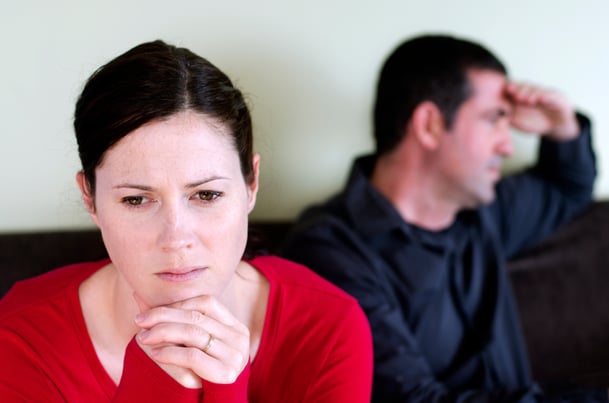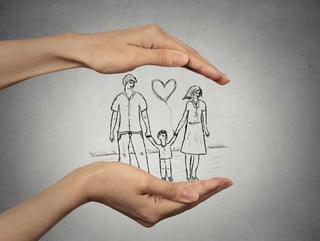
Have you ever been in a toxic relationship? Many of us have. How do we know enough is enough? And how are toxic relationships related to addiction?
"We don't always control what happens to us. But we ALWAYS control how we interpret what happens to us, as well as how we respond."
So writes New York Times bestselling author and blogger Mark Manson, and it’s true. We always have a choice about how to respond to the circumstances of our lives.
In today’s post, we take a deep dive into a tough decision we all face at one time or another: Should I stay or should I go?
If my partner is screaming at me, if my parents are being verbally abusive … what do I do?
What’s the most loving response?
How can I find the courage to take care of myself in difficult situations?
We find that many of our Program Participants are hungry for these answers; they want to know how their recovery is going to play out in real time, when they return to their homes, their relationships, and their newly sober lives.
In this video and article, we get really practical about the decision-making process in the context of challenging and toxic relationships. You'll learn:
- How to decide whether to stay present in a difficult situation and feel confident in your choice
- How dysfunctional relationships contribute to our confusion on this issue
- The difference between giving up too soon and taking good care of yourself
- How to prioritize caring for your inner child over people-pleasing
- Examples of healthy boundaries
- Becoming the parent you’ve always wanted for yourself
Addiction and Toxic Relationships
Today I want to talk with you about "should I stay or should I go" - that key question on how to navigate complex, toxic relationships and whether to leave them altogether.
I’m going to share a mental and emotional framework to help you decide whether you should stay present or step away in a challenging or difficult situation.
And know you can feel confident when you decide if you should stay or if you should leave.
We get a lot of questions from our addiction treatment participants about setting boundaries with the people in their lives: what's healthy and what's not with their families of origin, with their friends, with their partners.
A lot of times they're not sure, and with good reason.
What Do Healthy Relationships Look Like?
For many of us, if we grew up in dysfunctional households with dysfunctional family dynamics we don't really have a super strong sense for what healthy boundaries look like.
So there's a lot of confusion as we start to our addiction recovery.
"What should I put up with?" a lot of times is what people ask us.
They get frustrated.
They're thinking, "Is this too much? Should I just suck it up, and just get through this holiday, or should I take myself out of a situation that I know is going to be really difficult and challenging for me?"
Well there is no one right answer here.
Life is complex, and we're all different, and I can't possibly know your exact situation. So take all of this with a grain of salt.
Take what works, leave the rest.

This is also not about just leaving, and throwing up your hands, and walking out whenever things get hard. Sometimes when things get tough in relationships that's the point where love really tells you, "Okay, I really need to stay present. I need to hang in there, and I need to really give this a shot, and show up and be brave."
So this is not about copping out either.
What it is about is making an informed decision for yourself as to whether this is where you really need to be, and whether you're taking good care of yourself.
How to Take Care of Yourself First
The reason I want to tell this story is because it's one of the things that stood out to me the most when I spent time at The Clearing, a non 12-step rehab in the San Juan Islands of Washington State.
I had the very good fortune of being one of the participants. During our session, one of the co-founders, Betsy Koelzer, was talking about a time in her own life where she was in a situation where people were yelling at each other, hurling insults. It was just a very dysfunctional and dramatic situation.
She said what she had learned through her addiction recovery journey - her journey through healing from substance abuse and underlying core issues - was that she knew what to do in this situation.
The exact words that she said - I wrote them down because they stood out to me so clearly - was she was watching this situation with people yelling, and fighting, and just completely trashing each other.
And she said, "My precious self can't be here for this. My precious self can't be here for this."
She said it in this very tender way. Just this maternal, caring sense of, "You know, little Betsy can't be here for this."
Psychosocial Development in Early Childhood
She went on to explain this idea that while, of course, we were no longer five years old - we've grown up, we're all functional adults - there is a sense in which we remain five years old, six years old, seven years old, eight years old.

We all still carry those younger selves within us, and our parents are done raising us.
They had their chance to parent us when we were five, when we were six and seven, but not it is our turn. We're the adults in the relationships to our own inner children, right?
Follow me here. It gets kinda loopy.
So we're the parents now. We are the parents of our own inner children, and so the question we have to ask ourselves is, "Should my precious child be here for this?"
If that's too inward-looking, you can think of it as, "Would I bring my friend's child into a situation like this? Would I bring them into a space where people are throwing things at each other? Would I bring them into a space where people are using insulting and derogatory terminology and verbally abusing each other?"
I don't think so. I don't think you would do that.
More on psychosocial development in early childhood.
How to Setting Healthy Boundaries
So that is your litmus test. That is your way of knowing.
Should you be in a situation?
Well, if you're not sure, consider whether or not you would bring an innocent child into that situation.
If you would not, I strongly encourage you to think about leaving that situation.
Now, that doesn't necessarily mean leaving the relationship right away.
It might mean saying something like, "I'll be willing to talk to you as soon as you stop yelling."
"I'm not going to be here for yelling, but I'm willing to continue the conversation when you've calmed down."
It's not saying, "I'll never speak to you again."
But it's honoring the part of yourself that is vulnerable, the part that needs your love and needs your care.
A lot of times we think, as adults, we need to dig in our heels, and grit our teeth, and be really strong. That's all well and good if you're training for a marathon, if you're pushing through something that is difficult at work.
But when it comes to your personal relationships, there's no value in just subjecting yourself to pain for the sake of pain. It's not purposeful.
Take Care of Yourself First
So, again, my encouragement is be the parent you have always wanted for yourself.
Honor yourself.
Love the precious child that you were, and then in some sense you still are.

Recovering Addicts and Relationships
"Is this about addiction and relationships?"
Absolutely.
Absolutely it is, because a lot of times when we're dealing with addiction and substance abuse, the driving reason behind that are these feelings of grief, sadness, loss, trauma, despair that we haven't addressed that are connected to our relationships.
Maybe we're mourning from the loss of a loved one or a partner.
Maybe we are unable to heal from abuse that we've never acknowledged.
Absolutely there's this intricate relationship between addiction and relationships.



